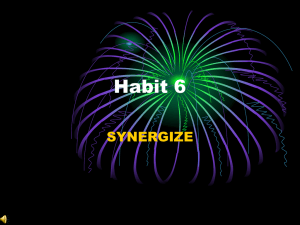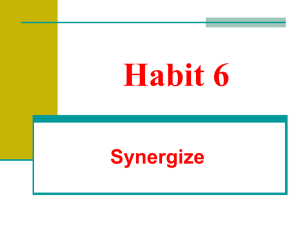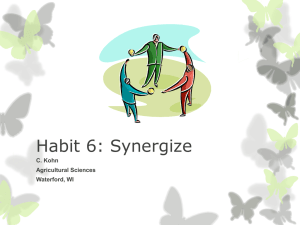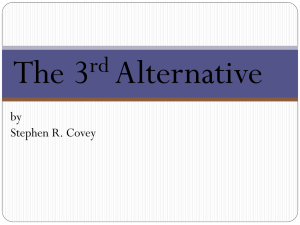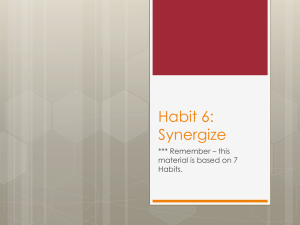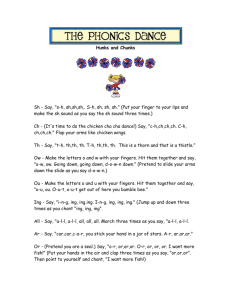Habit-6_Synergize-19..
advertisement
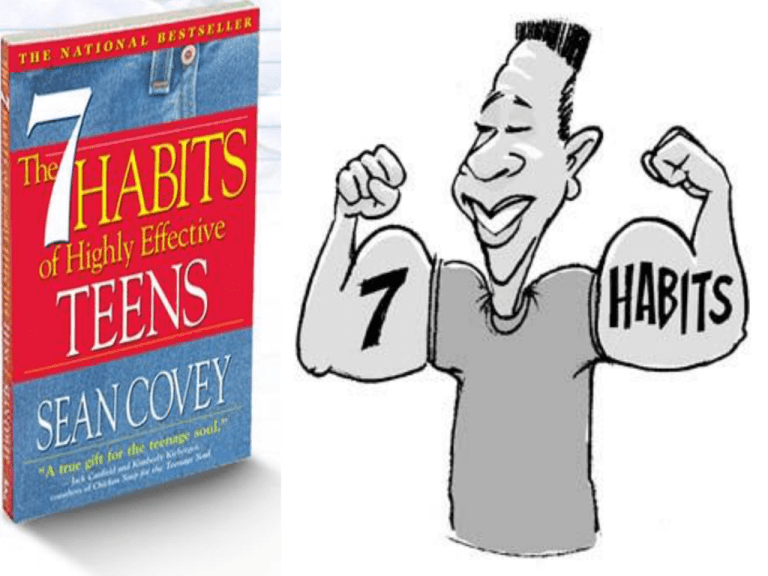
The 7 Habits of Highly Effective Teens Sharpen the Saw Synergize Seek First to Understand, Then to Be Understood Think Win-Win Put First Things First Begin with the End in Mind Be Proactive Habit 6: Synergize ALONE we can do so little; together we can do so much. Helen Keller Think of examples of TEAM work Give ONE example to echo what Helen Keller said. Think of examples of TEAM work Learning from geese What does ‘Synergize’ mean? Synergy is achieved when two or more people work together to create a better solution than either could alone. It’s not your way or my way but a better way, a higher way. Synergy is NOT Synergy is: Synergy is NOT: Celebrating differences Teamwork Tolerating differences Open-mindedness Finding new and better ways Working independently Thinking you’re always right Compromise Synergy is EVERYWHERE Synergy is EVERYWHERE We see them come We see them go Some are fast And some are slow Some are high And some are low Not one of them is like another Don’t ask us why Go ask your mother Possible approaches to Diversity Level 1: Shun diversity Level 2: Tolerate diversity Level 3: Celebrate diversity Shun Diversity Shunners are afraid of differences They may convince themselves their way of life is the ‘best’, ‘right’ or ‘only’ way. They may not enjoy dialogues of different ideas; or even confrontation. Tolerate Diversity Tolerators believe that everyone has the right to be different They don’t shun diversity but don’t embrace it either Their motto is: “You keep to yourself and I’ll keep to myself. You do your thing and let me do mine. You don’t bother me and I won’t bother you,” Tolerate Diversity The well water does not intrude into [interfere with] the river water 井水不 犯河水 Celebrate Diversity Celebrators value differences They see differences as an advantage, not a weakness. They’ve learned that two people who think differently can achieve more than two people who think alike. Celebrating differences doesn’t mean you have to agree with those differences Celebrate Diversity Diversity = Creative Sparks = Opportunity We learn differently The Seven Learning Styles Visual (spatial): Prefer using pictures, images, and spatial understanding. Aural (auditory-musical): Prefer using sound and music. Verbal (linguistic): Prefer using words, both in speech and writing. We learn differently The Seven Learning Styles Physical (kinesthetic): Prefer using your body, hands and sense of touch. Logical (mathematical): Prefer using logic, reasoning and systems. We learn differently The Seven Learning Styles Social (interpersonal): Prefer to learn in groups or with other people. Solitary (intrapersonal): Prefer to work alone and use self-study. We see differently We see differently We have different characteristics Dominance Influence Compliance Steadiness Reflection Celebrate the diversity in your class with your class teacher.
